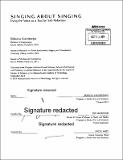| dc.contributor.advisor | Tod Machover. | en_US |
| dc.contributor.author | Kleinberger, Rébecca (Rébecca Henrietta Marie Franca) | en_US |
| dc.contributor.other | Massachusetts Institute of Technology. Department of Architecture. Program in Media Arts and Sciences. | en_US |
| dc.date.accessioned | 2015-02-25T17:13:34Z | |
| dc.date.available | 2015-02-25T17:13:34Z | |
| dc.date.copyright | 2014 | en_US |
| dc.date.issued | 2014 | en_US |
| dc.identifier.uri | http://hdl.handle.net/1721.1/95607 | |
| dc.description | Thesis: S.M., Massachusetts Institute of Technology, School of Architecture and Planning, Program in Media Arts and Sciences, 2014. | en_US |
| dc.description | Cataloged from PDF version of thesis. | en_US |
| dc.description | Includes bibliographical references (pages [93]-106). | en_US |
| dc.description.abstract | Our voice is an important part of our individuality. From the voice of others, we are able to understand a wealth of non-linguistic information, such as identity, social-cultural clues and emotional state. But the relationship we have with our own voice is less obvious. We don't hear it the same way others do, and our brain treats it differently from any other sound we hear. Yet its sonority is highly linked to our body and mind, and is deeply connected with how we are perceived by society and how we see ourselves. This thesis defends the idea that experiences and situations that make us hear, see and touch our voice differently have the potential to help us learn about ourselves in new and creative ways. We present a novel approach for designing self-reflective experiences based on the voice. After defining the theoretical basis, we present four design projects that inform the development of a framework for Self-Reflective Vocal Experiences. The main objective of this work is to provide a new lens for people to look at their voice, and to help people gain introspection and reflection upon their mental and physical state. Beyond this first goal, the methods presented here also have extended applications in the everyday use of technology, such as personalization of media content, gaming and computer-mediated communication. The framework and devices built for this thesis can also find a use in subclinical treatment of depression, tool design for the deaf community, and the design of human-computer interfaces for speech disorder treatment and prosody acquisition. | en_US |
| dc.description.statementofresponsibility | by Rébecca Kleinberger. | en_US |
| dc.format.extent | 109 pages | en_US |
| dc.language.iso | eng | en_US |
| dc.publisher | Massachusetts Institute of Technology | en_US |
| dc.rights | M.I.T. theses are protected by copyright. They may be viewed from this source for any purpose, but reproduction or distribution in any format is prohibited without written permission. See provided URL for inquiries about permission. | en_US |
| dc.rights.uri | http://dspace.mit.edu/handle/1721.1/7582 | en_US |
| dc.subject | Architecture. Program in Media Arts and Sciences. | en_US |
| dc.title | Singing about singing : using the voice as a tool for self-reflection | en_US |
| dc.title.alternative | Using the voice as a tool for self-reflection | en_US |
| dc.type | Thesis | en_US |
| dc.description.degree | S.M. | en_US |
| dc.contributor.department | Program in Media Arts and Sciences (Massachusetts Institute of Technology) | |
| dc.identifier.oclc | 903902138 | en_US |
